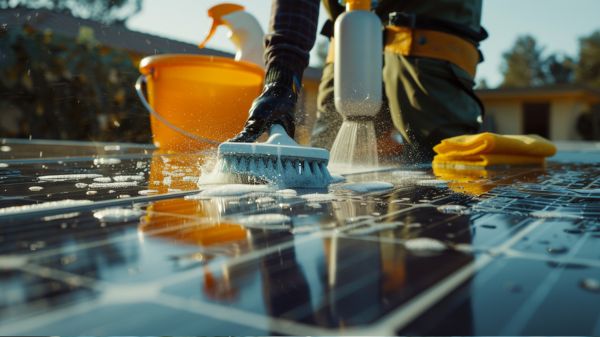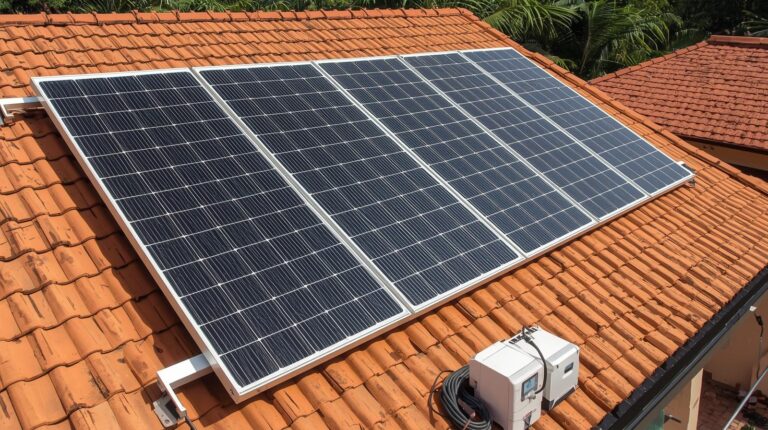Maintaining the efficiency of solar panels is critically dependent on their cleanliness, yet the methods of achieving this can vary considerably depending on environmental factors and the specific installations.
While many opt for manual cleaning with soft brushes and deionized water to avoid scratching and leaving residue, automated systems offer a less labor-intensive alternative, particularly beneficial for expansive solar farms. However, the debate continues about the effectiveness and cost-efficiency of newer technologies such as nanoparticle coatings and waterless cleaning methods.
Exploring the nuances and comparative advantages of these various approaches will illuminate the most practical solutions for different settings and needs.
Key Takeaways
- Use soft, non-abrasive brushes or sponges combined with deionized water to avoid scratching the panels.
- Avoid using harsh soaps or chemicals that can leave residues and impair solar efficiency.
- Consider automated cleaning systems for larger installations to ensure consistent and efficient cleaning.
- Apply nanoparticle coatings to reduce the frequency of cleanings by repelling dirt and dust.
- Ensure cleaning is done during cooler parts of the day to prevent thermal stress on the panels and personal discomfort.
Cleaning Equipment Overview
To assure peak performance of solar panels, various specialized cleaning equipment, including automated robots, waterless technologies, and manual tools, are employed to remove dirt and debris effectively.
Automated cleaning robots, such as those developed by Washpanel and Ecoppia, harness advanced technology to perform systematic cleaning across extensive solar farms, enhancing solar panel maintenance without human intervention. These robots considerably contribute to energy efficiency by maintaining ideal light absorption on panel surfaces.
Further, the use of soap-less brushes and sponges that utilize deionized water, as seen with solutions from Bland Company and Premier Solar Cleaning, guarantees that no residue hampers the panel’s functionality. This method not only preserves the integrity of the solar panels but also prevents the chemical buildup that can degrade panel surfaces over time.
Additionally, innovative nanoparticle coatings are applied to create a self-cleaning surface that repels dust and reduces cleaning frequency. For areas where water conservation is critical, waterless vibration technologies provide a viable solution by dislodging dust and debris without water.
For manual upkeep, tools like the Karcher High Pressure Washer offer a practical, cost-effective option. These tools allow for targeted cleaning, especially in smaller installations or regions where automated solutions are impractical, thereby supporting continuous energy efficiency through diligent solar panel maintenance.
Benefits of Regular Cleaning
Understanding the benefits of regular cleaning highlights how such maintenance not only boosts efficiency but also prolongs the operational life of solar panels.
Cleaning solar panels consistently mitigates the adverse effects of dirt buildup, which can impede the absorption of sunlight, essential for ideal energy production. This is particularly important for photovoltaic (PV) panels, as any layer of grime or debris can greatly reduce their output by up to 25%.
Maintaining clean solar panels is also an important practice for preventing costly repairs. By removing corrosive materials and potential obstructions that can affect the electrical components, regular cleaning protects the system’s integrity.
Additionally, the aesthetic and functional enhancements contribute considerably to the property’s value, guaranteeing that the solar installations are not only effective but also visually pleasing. Here is a summarized representation of the key benefits:
| Benefit | Impact on Solar Panels |
|---|---|
| Enhanced Energy Production | Reduces energy loss by up to 25% |
| Extended Operational Lifespan | Prevents degradation and damage |
| Prevention of Costly Repairs | Safeguards against system failures |
Regular cleaning, consequently, is a significant aspect of solar panel maintenance that guarantees sustained energy production and long-term viability.
Recommended Cleaning Practices
Implementing strategic cleaning practices is vital for maintaining the ideal performance of solar panels. Regular maintenance not only preserves the efficiency of your solar system but also extends its lifespan. Solar panels need cleaning 2-4 times annually to combat efficiency losses, which can soar up to 25% due to dust and debris accumulation.
To clean your panels effectively, opt for soft, non-abrasive brushes or sponges coupled with deionized water. This method avoids the pitfalls of using harsh soaps, which can leave residue that impedes solar absorption.
The choice of cleaning tools is critical; a soft brush ensures that the panel’s surface is not scratched, preserving the integrity of the panels while removing the dust effectively.
Environmental considerations also play a pivotal role in the frequency and methods of cleaning. For instance, panels located near highways or construction sites may require more frequent cleaning due to higher exposure to particulate matter.
Advanced options like soap-less brushes and automated robotic systems can provide thorough cleaning without the manual effort, enhancing the practicality and effectiveness of regular solar panel maintenance. These tailored solutions guarantee that the cleaning process is both efficient and adapted to specific situational needs.
Essential Safety Measures
Before initiating the cleaning process, always make sure that your solar panel system is turned off to prevent electrical accidents and guarantee safety. Prioritizing safety is essential to protect yourself and the solar panel system during the cleaning process. It is critical to adhere to the manufacturer’s safety guidelines to avoid any potential damage to the panels or personal injury.
Using a stable ladder provides secure access to the panels, minimizing the risk of falls. If cleaning requires you to work at significant heights, consider additional safety measures such as a safety harness. This not only prevents accidents but also provides peace of mind, allowing you to focus on effectively cleaning the panels.
Additionally, it is advisable to clean on a cool day. High temperatures can not only lead to personal discomfort but also increase the risk of thermal stress on the panels themselves.
Make sure you wear appropriate safety gear, including gloves and goggles, to protect yourself from potentially harmful cleaning solutions and debris. Such precautions are fundamental in maintaining both personal and system integrity during the cleaning process.
Here is a quick guide to essential safety measures:
| Safety Measure | Description |
|---|---|
| Turn off the system | Prevents electrical accidents |
| Use a stable ladder | Provides safe access to panels |
| Wear safety gear | Protects against cleaning solutions and debris |
| Clean on a cool day | Reduces risk of overheating and thermal stress |
| Follow manufacturer guidelines | Complies with safety standards and prevents damage |
Post-Cleaning Monitoring Techniques
Having outlined the necessary safety measures for cleaning solar panels, we now turn our attention to the effective monitoring techniques to evaluate their post-cleaning performance. Post-cleaning monitoring is vital to guarantee that the task of cleaning has effectively enhanced the energy production capabilities of the panels.
Firstly, energy generation should be carefully measured and compared with historical performance data. This quantitative analysis helps in verifying an increase in efficiency, typically diminished by up to 25% when panels are soiled. A significant improvement in energy output post-cleaning affirms the effectiveness of the cleaning process.
Additionally, employing thermal imaging or infrared cameras to inspect for hotspots is important. These hotspots may indicate underlying electrical issues or damage potentially exacerbated during the cleaning process. Detecting them early can prevent further deterioration of panel efficiency.
Routine visual inspections are also essential. They aid in identifying any residual dirt or debris that might necessitate further cleaning. This step guarantees the maintenance of peak performance between scheduled cleanings.
If discrepancies in expected and actual energy output persist, a professional assessment should be initiated. This helps to diagnose and rectify any non-cleanliness related faults, securing the longevity and productivity of your solar investment.
Frequency of Cleaning Needs
Determining the ideal frequency for cleaning solar panels relies heavily on environmental factors such as local dust levels, air pollution, and climatic conditions. To guarantee the efficiency of your PV system, it’s vital to establish a cleaning schedule that reflects the specific demands of your geographic and environmental context.
| Environment | Suggested Frequency | Considerations |
|---|---|---|
| High Dust Areas | Monthly | Near deserts, construction sites |
| Urban/Industrial | Bi-monthly | High pollution, frequent dust and dirt |
| Coastal | Every 3-4 months | Salt buildup, marine residues |
| Mostly Rainy | Semi-annually | Natural rainfall assists cleaning |
Regular manual cleaning is essential to keep them clean and maintain peak performance. Inspections should be a routine part of your solar panel cleaning process to identify when the accumulation of dust and dirt necessitates a thorough clean. Even minimal residue can diminish the output of your panels by up to 25%, underscoring the need to clean your solar panels diligently and regularly.
Adhering to a cleaning frequency that aligns with these guidelines will safeguard your investment and optimize the production of your solar array, guaranteeing liberation from inefficiency and high energy costs.
Choosing the Right Cleaning Method
How do you choose the most effective method to clean your solar panels? The key lies in understanding the specific needs of your photovoltaic cells and the environment they operate in.
For most residential solar panels, manual cleaning with soft brushes designed to prevent scratches is essential. These brushes should be used with deionized water, which avoids leaving residue that could impair panel efficiency.
Incorporating nanoparticle coatings on your panels can dramatically decrease the frequency of manual cleaning. These coatings create a repellent surface that deters dirt and debris, maintaining the panels’ best function with minimal intervention.
For larger solar arrays, automated cleaning systems provide a practical solution. These systems, either fully or semi-automated, eliminate the constant need for physical labor while ensuring consistent cleanliness across extensive installations.
Moreover, technology such as waterless vibration cleaning offers a revolutionary approach by using vibrations to shake off dirt without direct contact, preserving the integrity of the solar panels. This method is particularly beneficial in areas where water resources are scarce or where manual access is challenging.
Choosing the right cleaning method for your solar panels involves a balance of practicality, effectiveness, and sustainability, ensuring long-term energy efficiency and panel longevity.
Professional Cleaning Services
Professional cleaning services offer a specialized approach to maintaining solar panels, particularly in environments where pollution levels contribute to rapid accumulation of dirt and debris.
Utilizing advanced, eco-friendly solutions and techniques, these services guarantee the solar panels achieve peak performance. Regular maintenance by professionals not only preserves the efficiency of the panels but also extends their lifespan.
For homeowners, particularly those with panels in hard-to-reach locations or who are unable to perform the cleaning themselves due to age or mobility concerns, professional cleaning services provide a practical and safe solution.
These experts come equipped with the necessary tools to handle even the most challenging situations, guaranteeing that every panel is accessed and cleaned thoroughly.
Here’s a quick overview of what professional cleaning services offer:
| Feature | Benefit | Specifics |
|---|---|---|
| Specialized Equipment | Safely cleans without damage | Automated systems, soft brushes |
| Eco-Friendly Solutions | Protects environment, maintains panel efficiency | Biodegradable cleaning agents |
| Scheduled Maintenance | Consistent care, less personal hassle | Customizable frequency |
| Hard-to-Reach Access | No area left uncleaned | Specialized ladders, drones |
| Satisfaction Guarantees | Peace of mind | Warranties, performance promises |
Choosing professional cleaning services means guaranteeing that your investment in solar technology continues to yield returns through unimpeded, efficient energy production.
Common Cleaning Mistakes
Despite their necessity, certain common cleaning practices can inadvertently damage solar panels and compromise their efficiency. For instance, the use of abrasive tools such as coarse scrub brushes can scratch the protective surface of the panels. This not only impairs the aesthetic value but, more importantly, reduces their efficiency by obstructing the panels’ ability to absorb sunlight effectively.
In addition, many individuals apply harsh soaps or cleaning chemicals in an attempt to remove stubborn dirt build-up. However, these substances can leave behind a residue that not only attracts further dirt but may also chemically degrade the panel’s materials over time. This results in a vicious cycle of cleaning and re-soiling, which can greatly shorten the lifespan of the panels.
Additionally, overlooking the importance of adhering to local guidelines and manufacturer recommendations for solar panel maintenance is a prevalent oversight. This neglect can lead to using unsuitable cleaning methods that can cause irreversible damage.
Furthermore, ensuring safety during the cleaning process is paramount; neglecting to use appropriate safety gear when working at heights can lead to severe injuries. As a result, it is essential to approach solar panel cleaning with a well-informed mindset and respect for the technology’s specific care requirements.
Conclusion
In summary, maintaining solar panels through appropriate cleaning methods greatly enhances their efficiency and longevity. Employing soft brushes, deionized water, and automated systems, while adhering to safety standards and manufacturer recommendations, constitutes best practices.
Advanced technologies such as nanoparticle coatings and waterless systems further streamline the cleaning process. Regular monitoring post-cleaning guarantees peak performance.
Ultimately, choosing the correct cleaning frequency and method, potentially supplemented by professional services, is essential for maximizing solar panel functionality.




